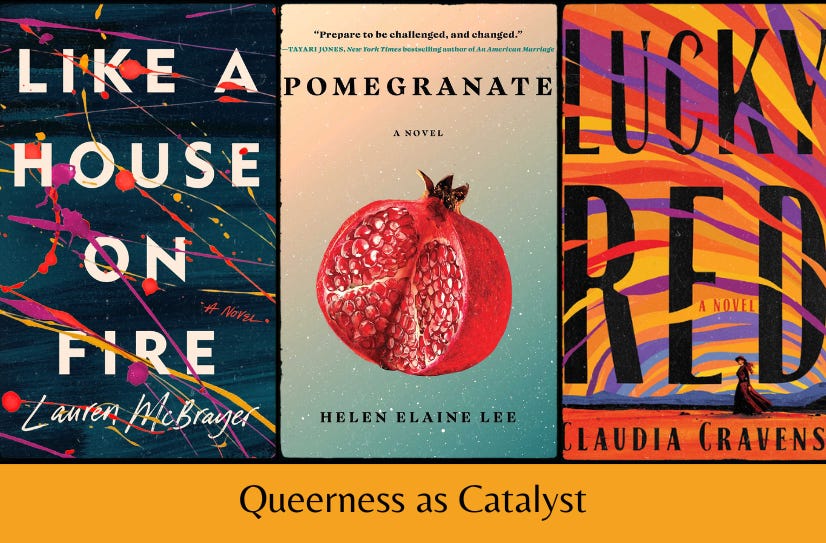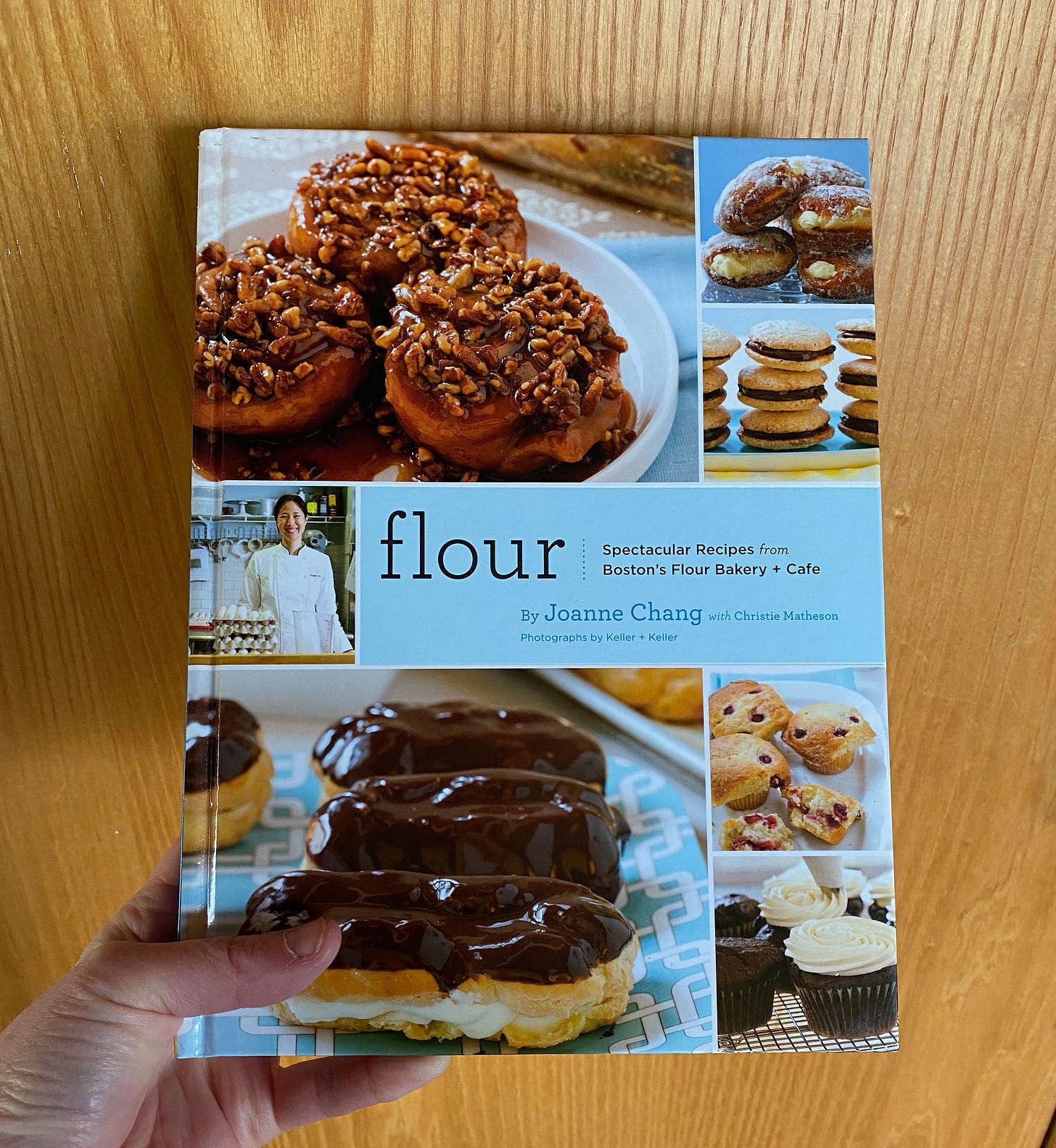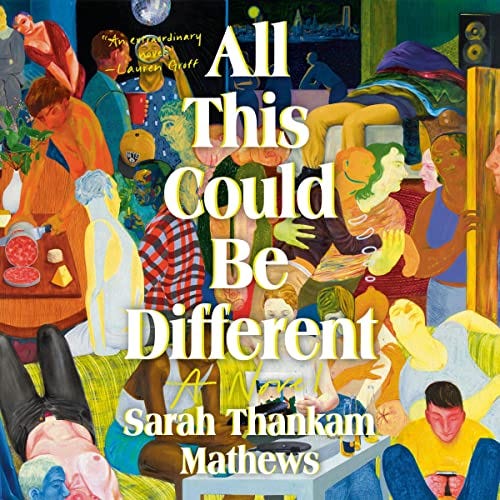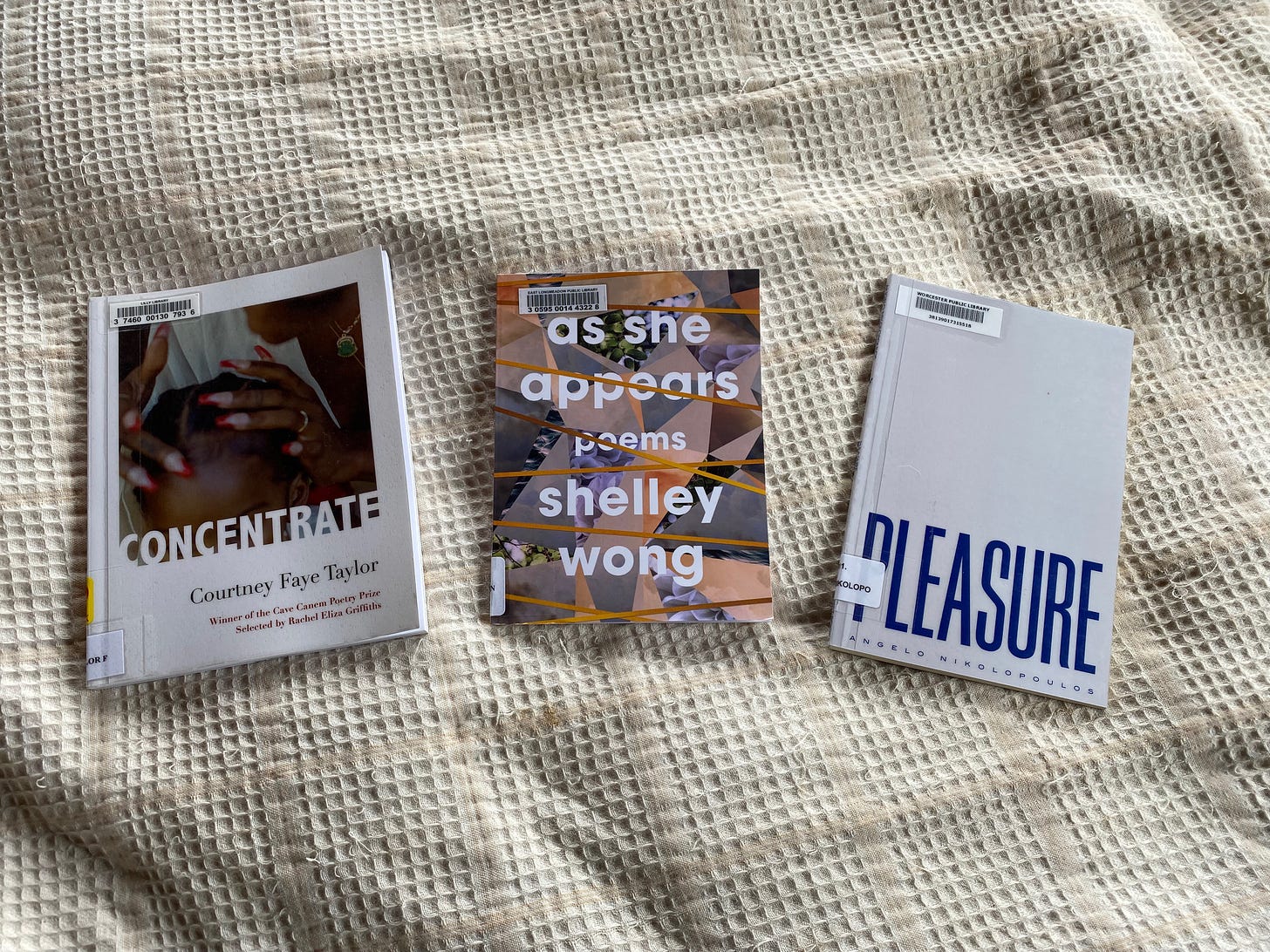Greetings, book and treat people! I can’t believe it’s already the last month of April and it’s time for another Queer Your Year raffle—more on that in the Queer Your Year section below, as always.
A newsletter reader recently asked me if there was an online discussion group for folks doing the challenge—there wasn’t, but I thought it was a great idea, so now there’s a Queer Your Year discord! I posted about it on Instagram and it’s been really fun so far. Please come join us! You can ask for recs, give recs, chat about what you’ve been reading, geek out about queer lit, you know, the usual. If you’re discord-shy, I promise it’s simple and totally worth it.
This is the last week to donate to the April Books for Trans Rights Fundraiser! There are some fantastic books still available, and I’d love to send them to good homes. I’ll be closing down the fundraiser at the end of the month, and sending the money we’ve raised ($900 so far!) to Intransitive in Arkansas, The Transformation Project in South Dakota, and My Sistah’s House in Tennessee.
In other news: A few weeks ago, I mentioned that I’d started writing for BuzzFeed Books. Now that BuzzFeed News has shut down, that gig is no more (all the books content was part of News). This year has been a string of small crises for me, one after another. And then I got this job: steady (or so I thought), well-paying, and doing something that I genuinely love. It felt like the first good thing to happen in months. It felt like a sign that this terrible year was finally going to get better.
So, yeah. It sucks. I’m discouraged and stressed. I have a lot of feelings about the way freelancers are treated by big companies. (I had only been writing for BuzzFeed for a month, but colleagues who’ve been writing there for years still haven’t heard anything about what’s going on with their jobs). I will be okay. But it sucks.
I’ve rewritten this sentence five times, but here it is, as bare as I can make it: if you enjoy this newsletter, and you can afford it, it would mean the world to me if you’d become a paying subscriber. That’s it, that’s the pitch. And because it’s spring, and because why not, I’m offering 50% off subscriptions from now through the end of May! That’s $33/year. It’s about $5 more than one hardcover book. I’m proud of the essays I send to paying subscribers (and I appreciate everyone who’s already subscribed so much), but I’ll be honest: my dream is to make all my newsletters free. But I can only do that if enough of you choose to support the work you value. That said, if you can’t afford a paid subscription (trust me, I get it), please email me, and I will comp you one!
That was a lot, so let’s get back to books—for the first time in ages I have a backlist, frontlist, and upcoming title! These three books about the ways that queerness can be disruptive and generative and healing, all at the same time. They feature characters whose queerness allows them to step into new worlds and imagine new possibilities.
The Books
Backlist: Like a House on Fire by Lauren McBrayer (Fiction, 2022)
I read this back in December, and I’ve been waiting to write about it because I wanted to pair it with two other books that explore queerness in a similar way—as a disruptive force. Merit is an unhappily married woman, an unhappy mother, and unhappy in her work and art. She has two young sons and a husband who she says she loves, but whom she seems to stay with out of inertia, or fear of the unknown, or simply because she’s never considered an alternative. She’s just taken a few years off from full-time work to focus on her art (she’s a painter) and her children. The book opens with her first big decision: she goes back to work at a large corporate architecture firm.
At the firm, she meets, becomes enamored with, and eventually falls in love with Jane, her boss. Jane is a Danish architect who’s brilliant and assured and 20 years older than Merit (Jane is in her late 50s, Merit in her late 30s). She seems to know herself in a way that Merit doesn’t—or, at least, in a way that Merit has never given herself the space for. They have a connection that’s easy (at least at first). I loved this part of the book. It’s a love story that feels simple. Jane and Merit do eventually get into (and work through) some thorny stuff, but for most of the book, they revel in each other’s company. They like talking to each other. They like having sex. They make each other laugh. It’s pretty banal, honestly, and I think it’s why the book worked so well for me: the love story, though it takes up a lot of space on the page, feels almost secondary. What’s happening underneath is the real story. Merit finally making choices toward something instead of just in response to whatever situation she finds herself in. Merit choosing what feels instinctively good instead of what she’s been taught to want.
Merit is unhappy and so she makes one change: she decides to go back to work. Going back to work is good, she likes not spending every hour of her day with her kids, she likes being out of the house, she likes not being surrounded by other moms. But it doesn’t fix anything. And then she falls in love with Jane, and that doesn’t fix anything, either. But it makes Merit want to keep on making changes. This, for me, is the heart of the book. This is queerness as catalyst, queerness as generative and disruptive force. Obviously there are experiences that can act as catalysts for change that aren’t falling in love with a woman for the first time at 39. But there is something particular about the dissonance of queerness that is very loud, that makes it harder to ignore the disruption. This is especially true for someone like Merit, whose marriage is so heteronormative, who spent years going along with the expectations the world set for her because they mostly fulfilled her as long as she didn’t look too closely.
A bookish friend of mine wrote a lackluster review of this. Our tastes often align; in this case, they didn’t. But something she said about Merit’s relationship with her husband Cory has stayed with me. Cory is super annoying. He’s this bland, mediocre, mostly terrible husband and father. I didn’t care about him at all. My friend pointed out that yes, Cory is awful, but Merit also continually refuses to ask him for what she wants and needs. He doesn’t do housework, he doesn’t do childcare, he doesn’t listen, and Merit just lets him. She doesn’t confront him about any of it. She even tells herself that it’s fine, he’s doing his best, he’s actually a pretty good partner. My friend pointed out how ridiculous and unbelievable this makes the book—of course, in this context, Merit’s relationship with Jane feels radical and new!
I agree with my friend’s assessment, but to me it doesn’t feel unbelievable at all. It feels true. In the end, it doesn’t really matter what kind of husband Cory is. Merit has lost herself. She’s flailing and ambivalent, caught up in a cycle of sameness she doesn’t know how to break. Sometimes it feels almost impossible to have those conversations, to make space for yourself, to do all that hard relational work. Sometimes the only way to break a cycle is to leave it. Merit’s unexpected and specific experience of queerness is her way out of a tangle. It’s an eruption that offers her a new way of seeing.
Frontlist: Pomegranate by Helen Elaine Lee (Fiction)
This is the sort of book that sounds very plotty, but it’s actually not plotty at all: it’s a beautiful character study about a Black queer woman fighting for her place in the world, determined to choose herself, over and over again, despite the endless racist systems and intersecting oppressions trying to crush her, demean her, make her smaller.
Ranita has just been released after serving a four-year prison sentence for drug possession. Now she’s determined to get her life back together. She doesn’t want to just go through the motions anymore—she wants joy, and fulfillment, and fun. Her plan is to stay sober, reunite with her kinds, and mend her various broken relationships with family members. But all of that is really hard, because the system is designed to make it hard. Much of Ranita’s day-to-day life is concerned with the minutia of survival: going to NA meetings, attending check-ins with her DCF caseworker, looking for a job, feeding herself. On top of all that, she’s finally trying to work through childhood trauma and the events that preceded her arrest. She’s dealing with enduring loss and grief, the material realities of racist systems, inhumane state violence. It’s a lot. It’s heavy. We live in a broken world, a world that breaks people. So this novel feels suffocating at times. Lee writes so truthfully about every bad thing, but she also writes truthfully about beauty. Ranita is not defined by her trauma, and she’s not defined by what she’s been forced to endure. Or—she is, but she is also defined by what she loves.
So much of this book is about softness. It’s about the tenderness and care and delight that Ranita finds again and again, despite. She finds it when she falls in love with Maxine, a fellow inmate. Her relationship with Maxine changes her, but not in a dramatic way. She doesn’t have a queer awakening. It’s more like a queer homecoming. Choosing queerness becomes a way for her to come back to herself, both while she’s incarcerated and afterward. As she struggles to rebuild her life, it’s queerness that she keeps returning to. Queer possibility helps her feel at home in her body. It grounds and comforts her. Queerness is one of the ways she heals. It makes her want to live.
This novel is also full of beautiful and complicated Black familial relationships and kinship networks. It is full of gardens and beloved trees, and the power of naming and knowing plants. Ranita loves trees so specifically. She also loves books so specifically. She has a deep connection with her father, who died while she was in prison, and her memories of him are healing, too. As are the relationships she rebuilds with her aunts, and her two kids. She is a storyteller and a writer. She is fierce and flawed and striving and soft. Her life is made up of a thousand particular loves.
What I’m trying to say is that this is a book about systemic injustice and sexual violence and racist institutions. It’s about all of these big-picture things, these rending truths about the world we live in. But it does not center those things. It centers the deeply specific ways that one woman loves and heals and moves through the world. This is what makes it so good and so beautiful.
It also has one of the most perfect endings I’ve encountered this year. I highly recommend the audiobook.
Upcoming: Lucky Red by Claudia Cravens (Historical Fiction, Dial Press, June 20th)
I’m not usually a fan of westerns, but oh did I love this one. It’s set in Kansas in 1877. After her father dies from a snakebite, sixteen-year-old Bridget finds her way to Dodge City. She’s alone, broken, starving. She’s used to taking care of herself, since her father didn’t do much caretaking, but she’s also terrified and has no idea how the world works. She’s taken in by two women who run a whorehouse, the Buffalo Queen, and finds a stability there she’s never known before. She has a roof over her head, a room of her own, enough to eat. Life in a brothel isn’t easy or simple, but it gives her a kind of freedom she’s never experienced. She makes friends. She feels cared for. She makes a lot of mistakes. And after months of having sex for money—something that Cravens writes about with wonderful directness—she discovers the pleasure of queer sex, and it breaks open her world. She eventually falls in love with a famous female gunslinger, and this further breaks open her world.
At first I thought this novel was going to feel like a typical western, with gunfights and gambling and lots of action. And it does have all of those things—the plot eventually takes off. If you’re looking for high-stakes adventure, you’ll find it. But if you, like me, can’t get excited about adventure that’s not firmly rooted in emotional entanglements, you will also love this book. Most of it is about life at the Buffalo Queen. It’s not dramatic or sensational. It’s about a queer teenager growing up in a community of sex workers. It’s about the details that define her life. The fights she gets into. Her crushes. Her clients. What makes her laugh. The things she learns the hard way about friendship, loyalty, pleasure, betrayal. It’s a very quiet book, but the stakes are high, because the stakes are always high when it’s your life.
For Bridget, queerness is certainly a catalyst, but it’s a complicated catalyst. Her first love affair does not go the way she thinks it will. This is true of most first loves, but that doesn’t make it any easier when you’re the person living through it. Queerness—queer desire, queer sex, queer gender expression, queer friendships, queer family structures—offers Bridget new ways of understanding herself and her world. But queerness also opens her up to heartbreak. Wanting something and being able to name it sometimes hurts. Claiming a queer identity is part of Bridget’s growing up, and that growing up includes recklessness and selfishness. Queer relationships in this novel don’t save anyone. In fact, there isn’t much heroism at all. There are just a bunch of women doing their best to survive. They take care of each other and they let each other down. Morality has nothing to do with it.
Cravens is so good at texture. Bridget’s world is small, but vivid. And then, when it all cracks open, all the buildup pay off. Eventually Bridget has to make choices. She has to take risks and own up to her actions. I am always in awe of good pacing when I find it, and the pacing in this novel is perfect. For most of the book Bridget can’t see herself the way we, as readers, can see her. And when she begins to understand herself more clearly, that’s when the narrative tension shifts. It’s glorious.
On top of all that, this book is funny and sexy and surprising. It’s deeply rooted in a different time and place, but it’s about enduring human messes: who and how we love, and how the loving changes us.
The Bake
Chocolate Cupcakes with Crispy Magic Frosting from Flour by Joanne Chang
This week’s recipe comes from one of my most beloved cookbooks. It’s where my go-brioche recipe comes from, as well as my favorite sugar and spice brioche buns that my nephew renamed “sugar roses" (it’s what they look like). I love so many recipes from this book (both the lemon raspberry cake and chocolate hazelnut dacquoise are perfection), but I’d never made these cupcakes until now!
Well, they’re a delight. The chocolate batter is super quick and easy to mix up with a whisk. The cupcakes are rich and chocolatey and moist. The frosting didn’t quite come together for me. It’s a buttercream that you make by heating egg whites and sugar, whipping them into a meringue, and adding butter. It’s possible I didn’t heat the egg white-sugar mixture enough. Or maybe my butter was too cold or too warm. The crackly crust the frosting is supposed to have didn’t materialize, and it was a bit grainy. It was still tasty, though, so this didn’t bother me too much. The cupcake recipe (easy and delicious) is the real star. If you don’t want to bother with a finicky frosting, you could top these with just about anything (simple buttercream, ganache, cream cheese frosting, whipped cream) instead.
Worth It?
Yes! The frosting is quite sweet, but I loved the traditional simplicity of these. If you’re craving old-fashioned chocolate birthday cupcakes, these are for you.
The Bowl & The Beat
The Bowl: Herby, Lemony Sheet-Pan Chicken with Root Veg
The other day I wanted something that tasted like spring, but all I had around were sprouting onions and on-their-way-out root vegetables. With the help of some herbs, butter, and lemon, I transformed those tired roots into the tastiest spring dinner.
In a large bowl, combine 3ish tablespoons (soft) butter, a bunch of chopped parsley, a few pressed garlic cloves, the zest of two lemons, and salt and pepper. Mix with your fingers or a fork until you have an herby compound butter. Place a few bone-in, skin-on chicken thighs on a large baking sheet, and spread about half of the butter mixture over them. Cut a few onions into thick slices. Chop whatever root vegetables you have around into chunks and/or slivers. I used a few potatoes, a sweet potato, and half a butternut squash (the other half was rotten). Add the vegetables to the bowl with the butter, along with some olive oil, the juice of one of the lemons, and some red pepper flakes. Mix to combine. Spread out the veggie mixture on the tray with the chicken. Add some sliced lemon rounds (seeds removed) and some chunks of feta. Bake at 450 for about 35 minutes, until the veggies are soft and the chicken crispy. Serve with more parsley, grated Parmesan, and lemon wedges.
The Beat: All This Could Be Different by Sarah Thankam Mathews, read by Reena Dutt
I’m giving myself the gift of a reread. You should, too. It’s always worth it. It’s possible I love this even more the second time around. The narration is great. I’m savoring it.
The Bookshelf
A Portal
Inspired by my friend Charlott, I’ve decided to attempt to read all of the 2023 Lambda Award poetry finalists. I’ve already read and loved a few (Brother Sleep, Beast at Every Threshold), and I was able to find a whole bunch more at my library. I’m excited!
I read As She Appears over the weekend, which I loved. I’m going to start Concentrate next. Have you read any of these collections? Come talk to me about queer poetry!
Around the Internet
On Book Riot, I ranted about book terms I hate. I also made a list of books that celebrate mundanity. My review of The Skin and Its Girl is up on BookPage.
Now Out / Can’t Wait!
Now Out
Since the BuzzFeed Books newsletter is no longer (as far as I know), I thought I’d share one of the reviews I wrote for this week. It’s a brilliant collection, don’t miss it!
Return by Emily Lee Luan (Nightboat Books): Poetry often feels like an attempt to translate what is not translatable, to put into words feelings that exist in the body, that are not easily legible or definable in any language. Emily Lee Luan’s astonishing debut directly addresses this tension: how does one write and live between languages and cultures? “Is there forgiveness / for us in either of our languages?” asks the speaker in ‘Anger Diaries’. In a blend of English and Chinese, Luan excavates and illuminates so many in-between spaces: the space between home and homeland, memory and experience, spoken and written language. These gorgeous poems about sorrow and longing and diaspora map her own and her family’s history in Taiwan and America. She uses an array of forms, including many poems that draw inspiration from Chinese “reversible poems,” which can be read in either direction—forward or backward. The whole collection is alive with movement; each poem sparks new questions. This is one of the most memorable debuts I’ve read this year, and one I’ll be thinking about for a long time.
Can’t Wait!
Our Hideous Progeny by C.E. McGill (Doubleday, May 9th): All you have to do is say “queer Frankenstein retelling” and I’m in.
Queer Your Year
News & Announcements
It’s time for the April raffle!
This month’s prize is a queer book bundle from The Feminist Press and, honestly, I’m jealous!
Anyone who submits a game card and has completed any of the winning prompts will get a prize pack. If you’ve already received a prize pack, you aren’t eligible for another one, but you can still enter the raffle for the monthly prize. Prize packs ship worldwide!
If you haven’t already downloaded your game card, you can do so here. This is also where you can submit your game card. Further details are here.
You have until April 30th to submit your game cards.
And now, the winning prompts! They are: 1, 2, 5, 6, 13, 15, 32, and 45.
Recs!
Prompt 19: A YA book without a central romance
I asked about this in the discord, because I’ve been having trouble finding one. Why are so many YA novels romances? I just want all the queer friendship books, please! Here are three I’ve already read and loved:
Kings of B’More by R. Eric Thomas: Black queer besties in Baltimore, having a day.
Darius the Great is Not Okay by Adib Khorram: An Iranian American teenager makes a really important friend on his first trip to Iran.
Sasha Masha by Agnes Borinsky: A trans coming of age novel that highlights the importance of queer mentorship and elders.
Prompt 26: A book recommended to you by a queer friend or family member
Here are three amazing books I picked up because of a recommendation. I’ve reviewed them all here—and recommend them to you! Internet friends totally count.
At the Bottom of the River by Jamaica Kincaid: Recommended to me (along with the rest of Kincaid’s work!) by Kiki (@ifthisisparadise).
God’s Children Are Little Broken Things by Arinze Ifeakandu: Recommended to me by Ian (@criticalgayze).
Dot & Ralfie by Amy Hoffman: Recommended (and lent) to me by my aunts!
The Boost
Sins Invalid recently hosted a free email class, Crip Crash Course, on disability justice. You can still sign up to get the emails!
I really enjoyed reading this short but informative post about historical queer joy in Regency England.
I recently started following The Truth School, which is based here in the Valley, and offers free classes (mostly on Zoom) focusing on social justice and leadership. They seem super rad.
As always, a little bit of beauty to send you on your way: I’m on my island this week, and I am, as always, head-over-heels in love.
Catch you next week, bookish friends! Next week’s essay will be about translation and what is untranslatable and why I love books that include untranslated passages in other languages. If you want to read it, you can subscribe here.











Just wanted to say I read and loved your BookRiot rant about the words we use to talk books. I also loathe the term “women’s fiction”, but I’m definitely guilty of using “literary” 😳
And I’m so sorry to hear about the Buzzfeed gig. I hope your year only gets better from here!
I'm so sorry you lost your job at Buzzfeed. That totally sucks. ☹️